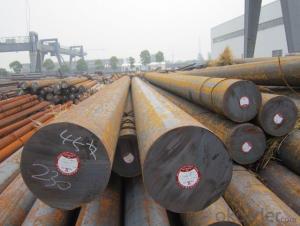Tool Steel Cold Rolled 1.2379 Steel Bar
- Loading Port:
- China main port
- Payment Terms:
- TT OR LC
- Min Order Qty:
- 30 m.t.
- Supply Capability:
- 10000 m.t./month
OKorder Service Pledge
OKorder Financial Service
You Might Also Like
Item specifice
Tool Steel Cold Rolled 1.2379 Steel Bar r
Product information:
Specifications
Hot Selling Tool Steel Cold Rolled 1.2379 Steel Bar Prices
1.A/N/Q+T
2.Sample free
3.Black or Bright
4.T Max:800mm
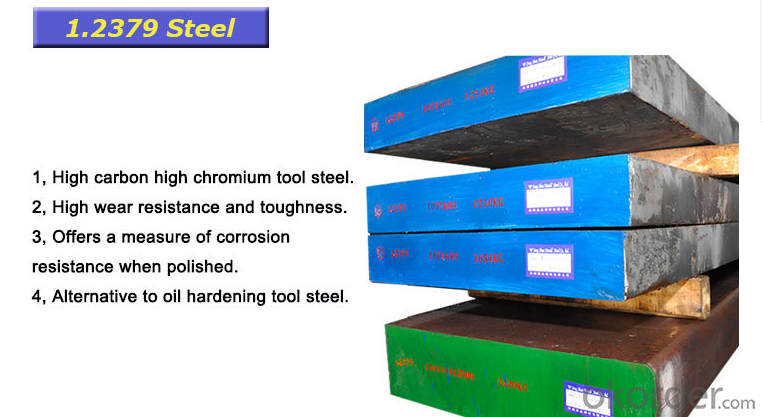
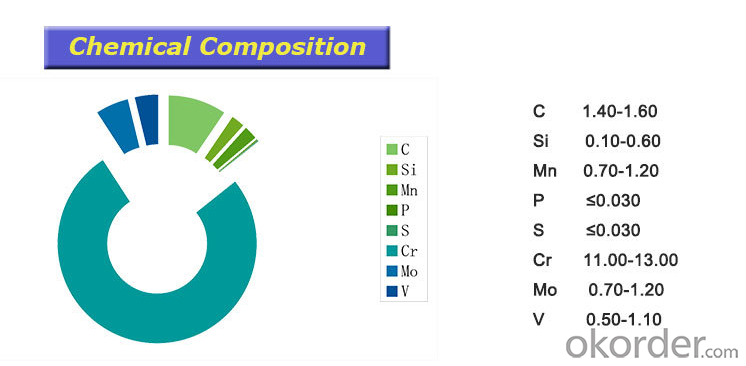
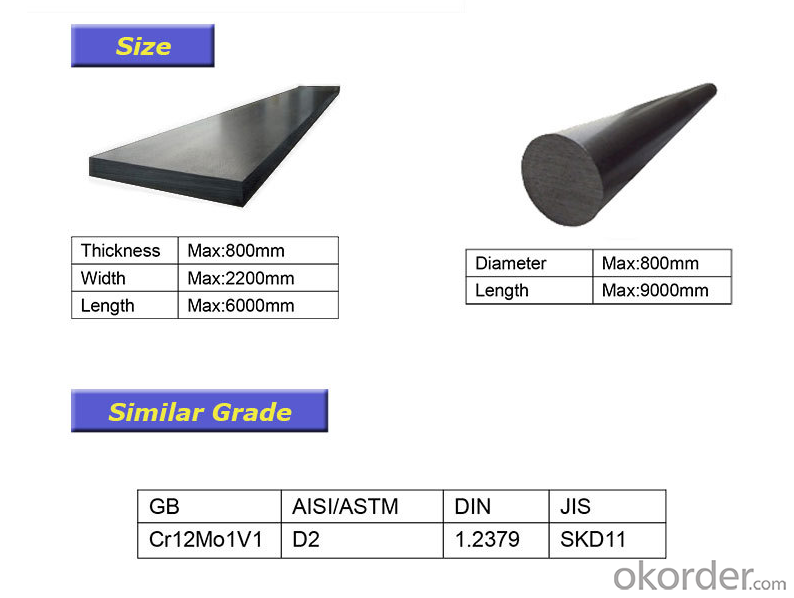
Product show
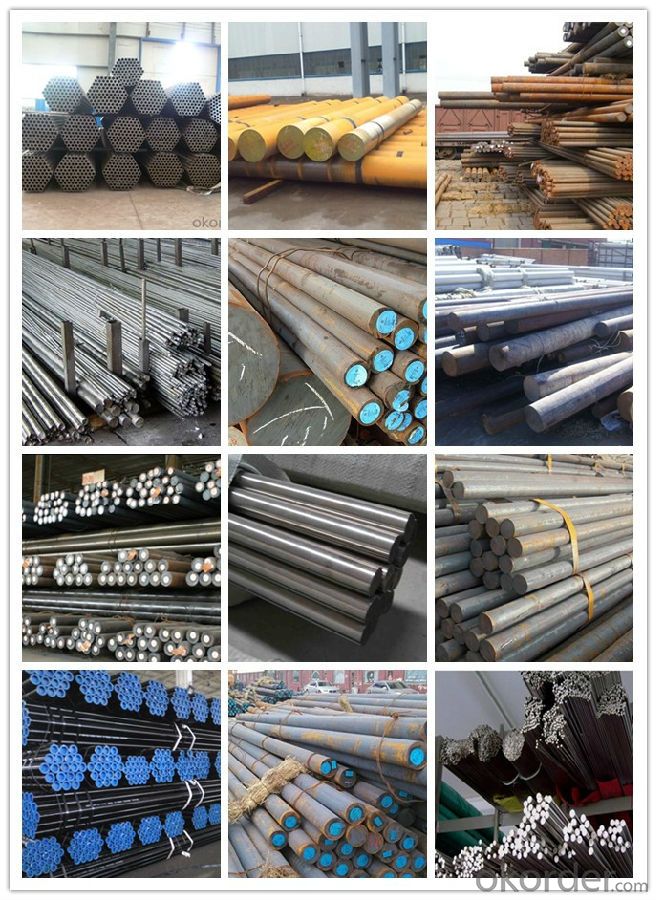
Workshop show
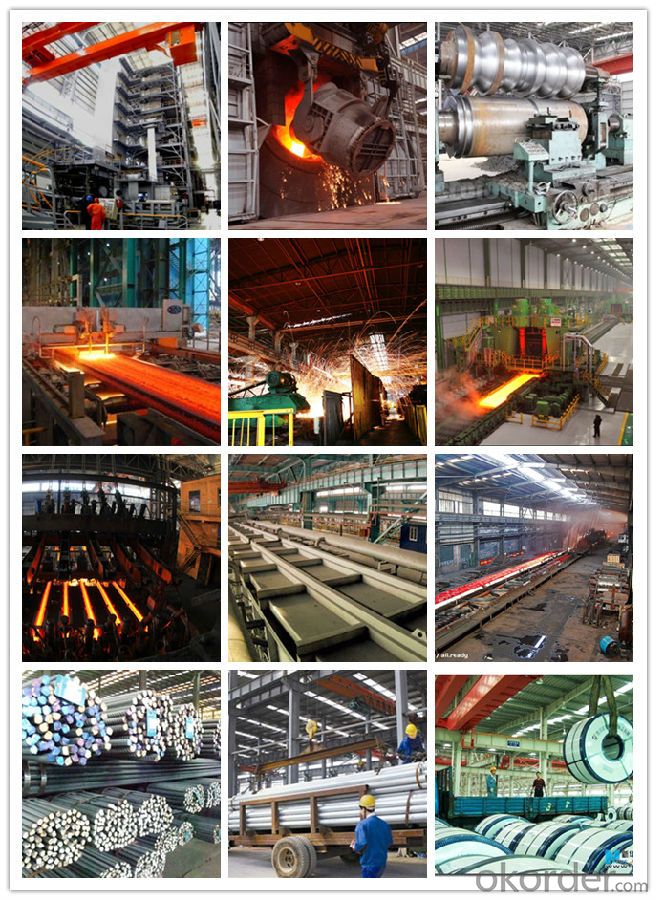
Our service:
-High manufacturing accuracy
-High strength
-Small inertia resistance
-Strong heat dissipation ability
-Good visual effect
-Reasonable price
Chose happens because of quality, then price, We can give you both.Additionally, we can also offer professional products inquiry, products knowledge train(for agents), smooth goods delivery, exellent customer solution proposals.Our service formula: good quality+good price+good service=customer's trust
SGS test is available, customer inspection before shipping is welcome, third party inspection is no problem.
If you need the sample, please feel free to let me know. Any question, we will contact you ASAP!
- Q:How does special steel perform in welding applications?
- Special steel, also known as alloy steel, performs exceptionally well in welding applications. Its unique composition, which includes various alloying elements such as manganese, chromium, and nickel, enhances its weldability and overall performance. The addition of these alloying elements significantly improves the strength, hardness, and corrosion resistance of the steel, making it highly suitable for welding applications. Special steel possesses excellent weldability, allowing for easy fusion and formation of strong and durable weld joints. Furthermore, the alloying elements in special steel also contribute to its heat resistance, making it capable of withstanding high temperatures during the welding process without losing its structural integrity. This property is particularly crucial in applications where welding involves high heat levels or prolonged exposure to extreme temperatures. Moreover, special steel exhibits good ductility and toughness, enabling it to withstand the stresses and strains associated with welding. It can effectively absorb and disperse heat during the welding process, minimizing the risk of distortion or cracking in the welded joints. In addition to its mechanical properties, special steel also offers excellent resistance to corrosion and oxidation. This makes it highly suitable for welding applications in environments where exposure to moisture, chemicals, or harsh weather conditions is a concern. The corrosion resistance of special steel ensures that the welded joints maintain their strength and integrity over time, even in challenging environmental conditions. Overall, the performance of special steel in welding applications is outstanding, owing to its excellent weldability, strength, heat resistance, and corrosion resistance. Its unique composition and properties make it a preferred choice for a wide range of welding projects, including structural fabrication, pipeline construction, automotive manufacturing, and many more.
- Q:What is the role of cobalt in special steel?
- Due to its unique properties and characteristics, cobalt plays a crucial role in special steel. It serves as a significant alloying element in the production of high-performance steel alloys, particularly those used in demanding applications where strength, hardness, and heat resistance are vital. Cobalt's primary function in special steel is to enhance its overall strength and toughness. By forming a solid solution with iron, cobalt creates a fine-grained microstructure that improves the mechanical properties of the steel. This results in increased hardness, wear resistance, and the ability to withstand high temperatures and harsh environments. Moreover, cobalt improves the steel's resistance to corrosion and oxidation, making it suitable for extreme conditions in industries like aerospace, oil and gas, and automotive. Additionally, it enhances the steel's magnetic properties, making it valuable in electrical and electronic devices. Another essential role of cobalt in special steel is its ability to facilitate the formation of stable carbides. The addition of cobalt aids in the precipitation and dispersion of carbides, contributing to the steel's high-temperature strength and excellent retention of hardness at elevated temperatures. Furthermore, cobalt assists in refining the grain structure of the steel, resulting in improved machinability and surface finish. It also allows for better control over the hardenability of the steel, determining its capacity for heat treatment and achieving desired hardness levels. To summarize, cobalt plays a multifaceted and indispensable role in special steel. It enhances the steel's strength, hardness, and toughness, improves its resistance to corrosion and oxidation, and enables it to withstand high temperatures. Cobalt also aids in refining the microstructure of the steel, enhancing machinability and allowing precise control over its hardenability.
- Q:How does special steel contribute to the thermal conductivity of products?
- Special steel can significantly contribute to the thermal conductivity of products due to its unique composition and properties. Special steel is manufactured with specific alloying elements, such as chromium, nickel, molybdenum, or vanadium, which enhance its thermal conductivity. These alloys help in the efficient transfer of heat by increasing the free electron density within the steel. The presence of alloying elements in special steel improves its lattice structure, allowing for better heat transfer. The increased free electron density enables quick and efficient movement of thermal energy through the material. As a result, special steel can effectively conduct heat from one area to another, making it ideal for applications requiring high thermal conductivity. Furthermore, special steel is often processed using advanced techniques like heat treatment, forging, or rolling, which further optimize its properties. These processes refine the microstructure of the steel, reducing impurities and improving its thermal conductivity. The resulting steel product exhibits enhanced heat transfer capabilities and provides efficient thermal management. The high thermal conductivity of special steel makes it highly desirable for various industries and applications. It is commonly used in the manufacturing of heat exchangers, boilers, furnaces, and other thermal equipment where efficient heat transfer is crucial. Additionally, special steel is often employed in electrical appliances, such as stovetops or induction cookers, where rapid and uniform heat distribution is necessary. In summary, special steel contributes to the thermal conductivity of products by utilizing specific alloying elements and advanced processing techniques to enhance its heat transfer capabilities. Its high thermal conductivity makes it a valuable material for various industries, ensuring efficient heat management and optimal performance of thermal equipment and appliances.
- Q:What are the properties of ultra-high-strength steel?
- Ultra-high-strength steel possesses exceptional mechanical properties, including high tensile strength, excellent toughness, and superior resistance to deformation, making it incredibly durable and robust. It exhibits remarkable load-bearing capabilities, enabling it to withstand heavy loads and extreme conditions without experiencing significant deformation or failure. Additionally, ultra-high-strength steel offers exceptional fatigue resistance, corrosion resistance, and the ability to maintain its structural integrity under high temperatures, making it an ideal material for demanding applications in industries such as aerospace, automotive, and construction.
- Q:How does special steel contribute to the energy industry?
- Special steel plays a crucial role in the energy industry by providing high-strength, corrosion-resistant materials that are essential for various applications. It is used in the construction of power plants, oil and gas pipelines, and offshore drilling platforms, ensuring the structural integrity and reliability of these critical infrastructure. Special steel also enables the production of more efficient wind turbines and solar panels, enhancing their performance and durability. Additionally, it is utilized in the manufacturing of equipment used in nuclear power plants, where its unique properties ensure safety and long-term operation. Overall, special steel is a vital component in the energy industry, supporting its growth, sustainability, and technological advancements.
- Q:What are the different chemical resistance grades of special steel?
- Special steels, commonly known as stainless steels, possess exceptional resistance to corrosion and chemical attack. They are a category of alloys that contain a substantial amount of chromium, which forms a protective oxide layer on the surface, preventing further corrosion. The chemical resistance of special steel may vary depending on the particular grade or alloy composition. Below are some of the typical chemical resistance grades of special steel: 1. Austenitic Stainless Steel: This is the most prevalent stainless steel type and exhibits excellent resistance to a broad range of chemicals, including organic acids, alkalis, and salts. The most commonly used grade in this category is 304 stainless steel. 2. Ferritic Stainless Steel: Ferritic stainless steels have lower corrosion resistance compared to austenitic grades but still offer good resistance to many chemicals. They are particularly resistant to nitric acid and some organic acids. Grade 430 stainless steel serves as a common example of ferritic stainless steel. 3. Martensitic Stainless Steel: Martensitic stainless steels are recognized for their high strength and hardness. Although they have lower corrosion resistance compared to austenitic and ferritic grades, they can still exhibit good resistance to certain chemicals, especially in mildly corrosive environments. 4. Duplex Stainless Steel: This type of stainless steel combines the properties of both austenitic and ferritic grades, resulting in enhanced strength and improved resistance to stress corrosion cracking. Duplex stainless steels offer excellent resistance to a wide range of chemicals, including organic acids, chloride-containing solutions, and saltwater. 5. Precipitation-Hardening Stainless Steel: These steels can undergo heat treatment to achieve high strength and corrosion resistance. They typically exhibit resistance to a broad range of chemicals, including organic acids, alkalis, and some organic solvents. It is crucial to note that the chemical resistance of any steel grade can also be affected by factors such as temperature, chemical concentration, and the presence of other corrosive agents. Therefore, it is advisable to consult the manufacturer's specifications or seek expert advice when selecting a special steel grade for specific chemical resistance requirements.
- Q:How does special steel perform in forging applications?
- Special steel is highly desirable for forging applications due to its exceptional strength, durability, and resistance to wear and tear. It offers superior performance as it can withstand the intense heat and pressure involved in the forging process without losing its shape or integrity. Additionally, special steel's unique composition allows for precise shaping and intricate designs, making it an ideal choice for complex forging projects.
- Q:How does nitriding steel improve hardness and wear resistance?
- Nitriding steel improves hardness and wear resistance by introducing nitrogen into the steel's surface through a heat treatment process. This forms nitrides, which are hard compounds that increase the material's surface hardness. Additionally, the nitrogen atoms create compressive stresses within the structure, enhancing the material's resistance to wear and fatigue.
- Q:How does special steel perform in abrasive wear applications?
- Special steel is renowned for its outstanding performance in applications where abrasive wear is present. Its design specifically caters to endure the harsh conditions and high levels of abrasion that occur in diverse industrial processes. A notable characteristic of special steel is its remarkable hardness. It can effectively withstand the abrasive forces exerted by different materials, such as rocks, sand, or minerals, without experiencing significant wear or deterioration. Achieving this hardness involves a combination of alloying elements and heat treatment processes, which enhance the steel's ability to maintain its structural integrity even under extreme wear conditions. Furthermore, special steel often possesses a high level of toughness, allowing it to absorb impact and resist fracture or chipping. This property is particularly crucial in applications involving abrasive wear, where materials frequently collide and generate high levels of stress. The toughness of special steel enables it to withstand these impacts and sustain its performance over an extended period. Moreover, special steel exhibits excellent corrosion resistance, which is vital in abrasive wear applications that involve exposure to moisture, chemicals, or other corrosive agents. This resistance guarantees that the steel does not deteriorate or lose its effectiveness due to chemical reactions or oxidation, extending its lifespan and reducing the need for maintenance. To summarize, special steel excels in abrasive wear applications due to its hardness, toughness, and corrosion resistance. These properties enable it to endure the challenging conditions and high levels of abrasion encountered in various industrial processes, ensuring long-lasting performance and minimizing downtime.
- Q:How is special steel used in the oil and gas industry?
- Special steel is used extensively in the oil and gas industry due to its unique properties and high strength. It is specifically designed to withstand harsh environments, corrosion, and extreme temperatures. Special steel is used in various applications such as drilling equipment, pipelines, storage tanks, and valves, ensuring reliability and safety in the extraction, transportation, and processing of oil and gas.
1. Manufacturer Overview |
|
|---|---|
| Location | |
| Year Established | |
| Annual Output Value | |
| Main Markets | |
| Company Certifications | |
2. Manufacturer Certificates |
|
|---|---|
| a) Certification Name | |
| Range | |
| Reference | |
| Validity Period | |
3. Manufacturer Capability |
|
|---|---|
| a)Trade Capacity | |
| Nearest Port | |
| Export Percentage | |
| No.of Employees in Trade Department | |
| Language Spoken: | |
| b)Factory Information | |
| Factory Size: | |
| No. of Production Lines | |
| Contract Manufacturing | |
| Product Price Range | |
Send your message to us
Tool Steel Cold Rolled 1.2379 Steel Bar
- Loading Port:
- China main port
- Payment Terms:
- TT OR LC
- Min Order Qty:
- 30 m.t.
- Supply Capability:
- 10000 m.t./month
OKorder Service Pledge
OKorder Financial Service
Similar products
New products
Hot products
Related keywords
